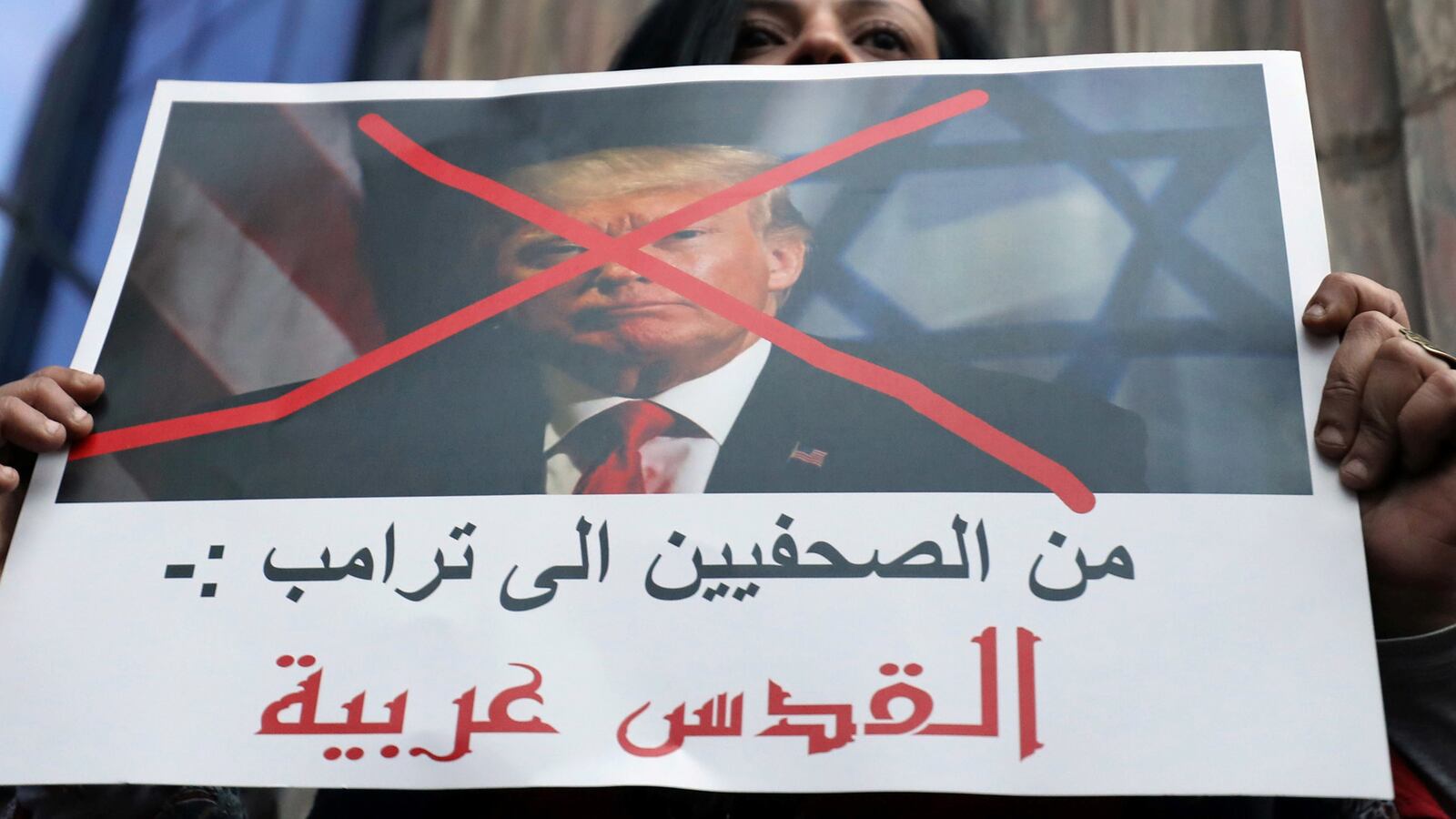CAIRO—News that U.S. President Donald Trump is recognizing Jerusalem as Israel’s capital and moving the American embassy there is on everyone’s lips in Egypt’s capital.
In the downtown area of Mounira, 51-year-old Yousri Ghareeb’s newsstand is covered with the Trump’s face staring out of front pages alongside shots of Jerusalem’s Al Aqsa mosque, and a fiery debate about the news is taking place among the small crowd gathered around the stand.
“I never liked him,” declares a short middle-aged woman in a turquoise hijab who punctuates each of her opinions with the handle of her walking stick.
Ghareeb responds diplomatically: “I used to like him before this, mainly because Sisi did; although that’s changed now.”
“But when Sisi went to meet him in America,” replies the woman, “what did he get out of it? Oh sure, he was very nice and respectful and said all the right things, and then as soon he left, Trump set about undermining Muslims around the world.”
The sidewalk conversation underscores a major problem for Abdel Fattah el-Sisi, president of the Arab world’s most populous nation. His relations with the Obama administration were poor. In Trump he thought he’d found a new ally and champion. But the Jerusalem gesture makes those ties appear suddenly problematic.
Demonstrations have been reported in Tunisia, Turkey, and Palestine itself—with growing talk of general strikes and “days of rage.” Here, the atmosphere is tense even if the streets are calm.
Cairo is still reeling from the largest terrorist attack in its history, which took place just a fortnight ago, and with a new Egyptian presidential election just around the corner, the security forces are in no mood to tolerate disorder. Unauthorized demonstrations remain illegal in Egypt, following anti-protest legislation that was passed in the wake of Arab Spring, and few are expecting impromptu protests to break out here.
But that doesn’t mean emotions aren’t running high.
The Israeli-Palestinian issue strikes a particular chord in Egypt. This year marks the 50th anniversary of the Six Day War, in which between 10,000 and 15,000 Egyptian soldiers were killed. Egypt lost similar numbers of troops again in the 1973 Yom Kippur War, and casualties of both conflicts are still very much a part of the nation’s living memory.
“Palestine represents the consequences of the Western colonial enterprise in the Arab world,” says H.A. Hellyer, senior non-resident fellow at the Atlantic Council and the Royal United Services Institute. “The Zionist project of building a Jewish state in Palestine would have been impossible without the cooperation of the British occupation at the time.”
Egypt itself was under British colonial occupation for well over half a century, and according to Hellyer, the Palestine issue “signifies for many Arabs a reminder that their autonomy is not complete. Yes, colonialism was overcome, but actual agency of the Arab citizen, as comparable to the agency of various other peoples around the globe, is circumscribed in much of the Arab world.”
It’s perhaps surprising then that, until this week, Trump was seen by the Egyptian government as an ally. Despite his frequent anti-Muslim rhetoric, as well as his contentious “Muslim travel ban”—although it has never included Egypt—Trump found support among backers of from the current president, Abdel Fattah el-Sisi, who met his U.S. counterpart on the campaign trail in America and was the first head of state to telephone him to congratulate his win.
But with this latest decision, Trump has made it much more difficult for Arab leaders to sing his praises in public. Soon after his announcement, Arab Twitter accounts began pumping out phrases like “Jerusalem is the eternal Palestinian capital,” as a flood of millennials took to the internet to voice their anger. In Egypt, by Thursday, it was still the top-trending hashtag, with other related phrases performing highly.
Criticism of the move went right to the top, with scores of politicians and religious figures denouncing it. President Sisi made what was really his first public admonition of Donald Trump, claiming on Tuesday that he called Trump before his announcement, warning him against “complicating matters in the Middle East.”
Other Middle East leaders have also denounced the move, with another U.S. ally, King Salman bin Abdulaziz of Saudi Arabia, telling Trump in a separate phone call that the recognition was “a dangerous step...likely to inflame the passions of Muslims around the world.” The Palestinians, for their part, have dubbed the decision “the kiss of death” for peace talks.
Yet Hellyer of the Atlantic Council says he doesn’t expect President Sisi to dwell on this issue much longer. Having already denounced the decision, he believes that Sisi will now be thinking about the many interests he has in staying on good terms with the U.S. administration. “In this regard,” says Hellyer, “he’s not that different from many other political leaders.”
Non-politicians in Egypt, however, haven’t held back. Ahmed al-Tayyeb, the Grand Imam of Egypt’s Al-Azhar university—the de facto seat of Sunni learning throughout the Muslim world—in a meeting with former British Prime Minister Tony Blair on Tuesday, declared that “the relocation of foreign embassies to Jerusalem would open up the gates of hell to the Western world.”
Despite deep divisions in the country, on this issue at least Egypt seems united. Members of the deposed, and outlawed, Muslim Brotherhood group have made numerous statements “declaring war” on America for its decision. So, for once, even the government-oriented press and the ousted Brotherhood seem to be singing from the same hymn sheet.
“Trump is betting that our interests with the United States are more important than our connection with Jerusalem,” announced the bestacled Lamees El-Hadidi on her Tuesday night TV show. “But whether it’s Egypt, Saudi Arabia, Jordan, the Emirates; all of the Arab World is saying: “You bet wrong. For us, the case of Jerusalem is a matter of life and death.”






